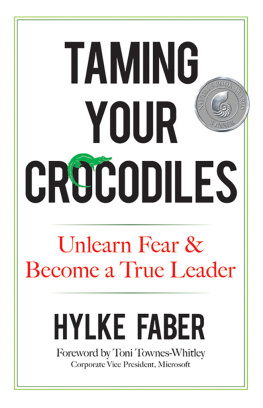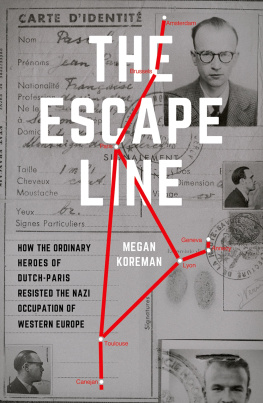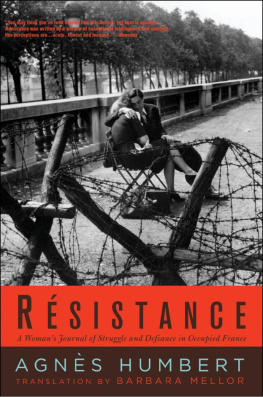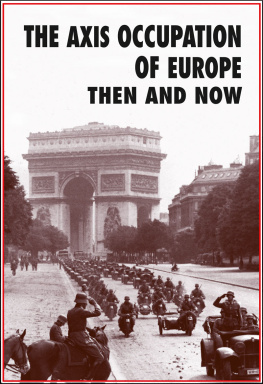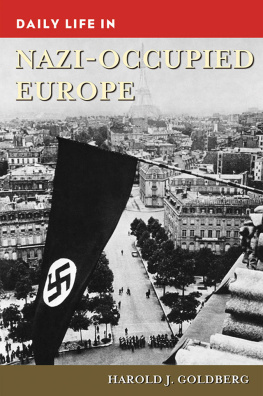ESCAPING OCCUPIED EUROPE
A DUTCHMANS DANGEROUS JOURNEY TO JOIN THE ALLIES
ESCAPING OCCUPIED EUROPE
A DUTCHMANS DANGEROUS JOURNEY TO JOIN THE ALLIES
AS WRITTEN BY DANIL DE MOULIN
HYLKE FABER AND PIETER STOLK
TRANSLATED BY DIEKE VAN WIJNEN REPUBLIC OF LETTERS TRANSLATIONS
Originally published in Dutch by Stichting DdM, 2006
as
Wij zijn niet bang, tenminste, niet erg.
Het Engelandvaardersdagboek van
Danil de Moulin
Second revised edition DdM Works, 2015
First published in Great Britain in 2018 by
PEN AND SWORD HISTORY
an imprint of
Pen & Sword Books Ltd
Yorkshire - Philadelphia
Copyright Hylke Faber and Pieter Stolk, 2018
ISBN 978 1 52674 122 6
eISBN 978 1 52674 123 3
Mobi ISBN 978 1 52674 124 0
The right of Hylke Faber and Pieter Stolk to be identified as Authors of this work has been asserted by them in accordance with the Copyright, Designs and Patents Act 1988.
A CIP catalogue record for this book is available from the British Library.
All rights reserved. No part of this book may be reproduced or transmitted in any form or by any means, electronic or mechanical including photocopying, recording or by any information storage and retrieval system, without permission from the Publisher in writing.
Pen & Sword Books Ltd incorporates the Imprints of Pen & Sword Books Archaeology, Atlas, Aviation, Battleground, Discovery, Family History, History, Maritime, Military, Naval, Politics, Railways, Select, Transport, True Crime, Fiction, Frontline Books, Leo Cooper, Praetorian Press, Seaforth Publishing, Wharncliffe and White Owl.
For a complete list of Pen & Sword titles please contact
PEN & SWORD BOOKS LIMITED
47 Church Street, Barnsley, South Yorkshire, S70 2AS, England
E-mail:
Website: www.pen-and-sword.co.uk
or
PEN AND SWORD BOOKS
1950 Lawrence Rd, Havertown, PA 19083, USA
E-mail:

Editors Note
On 9 July 2008, exactly sixty-five years after Danil De Moulin crossed the French-Spanish border in the Pyrenees, we crossed the same mountains in his footsteps with this travelogue as our guide. It was the culmination of almost five years of work during weekends, holidays and evenings, in which we pieced together De Moulins story. Now, ten years later, we are proud to share De Moulins words and the history of those men and women who escaped to England during the Second World War, the so-called Engelandvaarders, with an international audience. The travelogue you have in your hands was written in London in February 1944 by Danil de Moulin after his Engelandvaart.
Our quest which led to this book began at a fraternity in Utrecht, the very same place where, in a long-lost past, De Moulin himself had set foot. We knew that he had escaped to England and that he had played a role in the student resistance movement in Utrecht, but that was really all we knew. The sheer lack of information aroused our curiosity; we wanted to try and paint a picture of a period in the life of someone who resembled us both in terms of age and background, but who had been forced to make decisions that for us seemed unthinkable. Because some friends of De Moulin were still alive at that moment, this appeared to us to be a perfect opportunity to collect the still available pieces of the puzzle relating to De Moulins war history.
Initially, we concluded our research in May of 2005 with a short article. Through interviews and archival research, we had succeeded in piecing together the historical facts, but felt we had not been successful in giving it colour. In particular, there were gaps in the reconstruction of the journey to London due to the lack of personal details. However, not long afterwards, De Moulins personal travelogue was found in his widows estate. Now we possessed the story we had been searching for. The first Dutch edition of the travelogue was published in May 2006. Nine years later, in 2015 we published the second revised edition.
Why bother telling this story almost seventy-five years after the end of the Second World War? Unlike many war stories, this is not a big story full of fighting and death-defying heroic actions. As far as we know, De Moulin was not involved in the violent resistance in the occupied Netherlands. On the contrary, he was part of the intellectual resistance by students and professors. De Moulins journey to England was special, but certainly not unique.
At the same time, that in itself is exactly where the value of his text lies. De Moulins travelogue is the story of a 20-year-old who found himself in a situation which, for him, was no longer tenable and forced him to leave the Netherlands and join the Allied forces. The lively way in which De Moulin describes his preparations and his poignant and humorous descriptions of those who shared his fate make the text exceptionally interesting and worth reading for todays audience.
In addition to the full text of the travelogue, this book also includes supporting chapters and appendices, which provide the context for De Moulins story. The first chapter sketches the background of his life as a student in Utrecht and his activities during the first part of the war. The next chapter draws a picture of the Engelandvaarders, their reasons for leaving the Netherlands, and how they reached England. Finally, there is a summary of De Moulins life after his journey to England, as well as that of his travel companions Lodewijk Parren and Rolande Kloesmeijer.
Whilst this publication gives a detailed picture of Engelandvaarder De Moulin, we know very little about the exact content of his resistance work which was, in part, what drove him to leave the Netherlands in May 1943. To a certain extent, this is not surprising; there are many people about whom not much is known regarding the details of their resistance work during the war. After the war, this was a subject that many were unwilling to discuss. Hence, information about it in written sources is limited and many of those who were indirectly involved in it and with whom we spoke, could not remember the details after so many years.
De Moulin begins his story by saying that the travelogue was only intended for his immediate family. Although we obviously did not respect his wishes by publishing this book, we believe that our goal in doing so, and the fact that so much time has passed since it was written, justifies our choice. Our decision was determined by our belief that this publication does not violate either his memory or that of his loved ones.
In fact, in publishing this book we seek to keep alive the memory of Danil de Moulin and the many who chose to put their lives at risk to regain our freedom. We hope that you will enjoy reading De Moulins travelogue and that it will give you the opportunity to not only reflect on this story, but also on the many other stories which have never been told, or never will be.
Amsterdam, 9 July 2018
Hylke Faber


